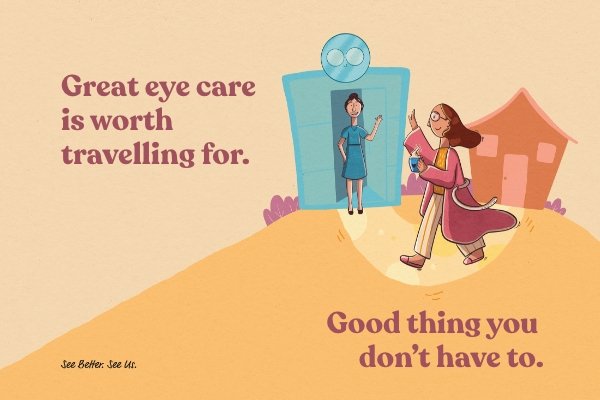eye tests
Peace of Mind
Routine eye exams are important for detecting signs of eye or vision problems early; sometimes these signs may even point to other health issues. Our optometrists and staff are constantly being trained so we can advise you with the best possible information.
Children aged 3 and up can have regular eye exams, but we can examine even younger infants if there are specific eye-related concerns. Just observing a child will not tell you if they have a serious eye problem. A child first eye test should be before they are 5 years old.
Over 50% of your brain is involved in processing your vision, so we strive to ensure your eyes and vision are healthy.
We are happy to send you a report about your vision and often your GP will need a copy too.
We have arranged longer appointment times to allow for thorough examinations while maintaining strict hygiene protocols.
What’s involved in an eye exam?
Every consultation with our optometrists is customised and tailored to your specific needs. We are happy to discuss any eye, vision or health concerns you may have. Remember to tell us that you love doing - sport, hobbies, craft - they all need vision. We may also ask questions about relevant medical or family history. From there, we may run a range of tests including measuring your vision and refraction, and examining the external and internal structure of the eyes with slit-lamp microscope. If you have any eye irritation we can look for the cause and suggest the best eye-drop treatment. More specialised testing may also be performed, such as visual field assessments (perimetry), OCT scans and retinal imaging, and visual information processing assessments. We may also perform therapeutic procedures such as gland expression for dry eye or removal of foreign bodies from the surface of the eye. For those with dizziness, especially after concussion or stroke, we can assess the role vision is playing and use treatments to reduce symptoms.
Early detection and treatment can save sight
Most vision problems are preventable or correctable especially if found and managed early. Something New: Keratoconus and Myopia (shortsightedness) can be slowed down if we find it is progressing too fast. Teens and young adults need to be checked regularly because various treatment options are available if needed. In the past we just updated glasses, but now we think about slowing the vision change with myopia control drops or special glasses etc. Deferring your new glasses may cause eye strain which can make your vision worse. Its a different way of thinking about your eyes.
If you have any eye or vision related concerns, please book an appointment with us using the Myhealth1st app or the Book Now button on our web pages or call during our business hours.
Other exam types offered
CASA Civil aviation safety authority (Credentialed Optometrist assessment)
Vic Roads licence checks
Contact lens fitting
Laser eye surgery assessment
Dry eye assessment
Post Concussional Syndrome (neuro optometric assessment for filters, prism etc)
Colour vision
Low vision
Reading issues and school readiness for children / visual perception
Consultation costs
We ask that the fees associated with consultations be paid on the day of the consultation. Glasses can be paid for on collection. The cost of an initial consultation is generally $90, and we will process a Medicare rebate claim for you upon payment- your rebate will be between $28-63 depending on your eligibility.
Certain treatment or imaging procedures may incur additional cost and may not attract a Medicare rebate; you will be advised if the procedure is required- please discuss with your optometrist if you are unsure.
Our testing locations
Hamilton Mon - Fri.
Casterton Wed - Thurs.
Balmoral every 6 months.
Coleraine every 3 months.
Harrow every 12 months.
Dartmoor every 12 months.
Penshurst every 12 months.
Winda Mara (Hamilton) monthly.


